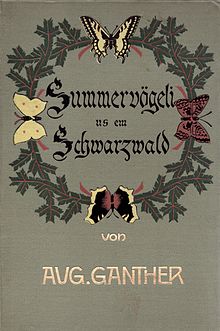August Ganther

August Ganther (born March 9, 1862 in Oberkirch ; † April 5, 1938 Vöhrenbach ) was a Black Forest native poet whose works are largely written in the Alemannic dialect .
Life
August Ganther was born as the son of the master turner Johann Georg Ganther (1824–1875) and his wife Brigitta, nee. Götz (1829–1870) born. He had three siblings. His father had already written and read poems. Ganther was orphaned at the age of thirteen. The poem "Das Glück" takes up this situation:
They
lived for two in a narrow room high up.
Often when the evening sun was fading,
Often they sat hand in hand
and looked at the door with a tired look
and waited for happiness.
Four little children came
into the tight, narrow room.
And each
knocked on the door, All four of the children looked up.
The longing spoke from every glance;
They waited for luck.
And when
the simple, black shrine was carried away from the little room,
In it lay the faithful mother, who
took care of her night and day, then
they knew: It will never return!
We had it - the luck.
Nevertheless, Ganther was able to complete a teacher training course. At first he taught in Malsch , Pforzheim , Immendingen and Möhringen ; from 1886 at the Lessing School in Freiburg, which became his second home and where he is buried. Originally an occasional poet, after the initial success of his poems written in the Alemannic dialect , he devoted himself intensively to his writing activities. Ganther also appeared as a singer and was trained by the bass Theodor Hieber (1867-1938). The importance he attached to the oral performance of his poems can be seen in the motto: “M'r sin für 's Ohr! / Walk, tell us! ". In 1890 he married Helene Deger (1869–1920), with whom he had three children. He died at the age of 76 in Vöhrenbach, where his son Rudolf was a doctor. In Freiburg and in Oberkirch a street is named after him. The Werkrealschule in Oberkirch also bears his name.
Works
Poetry
- Dannezapfe us em Black Forest , (1899)
- Silwerdischtle us em Black Forest (1903)
- Wälderlüt (1905)
- Bluebells (1906)
- Summer birds in the Black Forest (1908)
- Katzebusseli us in the Black Forest (1910)
- Herrgottschüehli us in the Black Forest (1920)
- Duwekröpfli us em Black Forest (1921)
- Waldbrünnili (1923)
- From the estate: Wildbächli 1939
Stories u. Novels
- Stechbalma (1900)
- From Silent Valleys (1904)
- Mountain swallows
- The debt miller
- The heir from the Birkenhof (1909)
- Schloßbauer's sons
- Shepherd's gold-haired: novel from d. Black Forest (1910)
- Heinerle with the basket
- The cousin from Transylvania (1924)
Plays
- The Klosterschütz: cheerful folk piece (1928)
literature
- Franz Brümmer: Lexicon of German poets and prose writers from the beginning of the 19th century to the present . Volume 2. Brockhaus, Leipzig 1913, p. 320.
- Hesselbacher, Karl, silhouettes of recent Baden poets , Heilbronn, Salzer, 1910. With 15 portraits a. Book decorations by Hellmut Eichrodt
- Michael Jacob, Ed., August Ganther on his 150th birthday , Lahr: Lahr Verlag, 2012
- Kalchthaler, Peter; Walter Preker [Hrsg.], Freiburg Biographies , Freiburg im Breisgau, Promo-Verlag 2002
- Irmgard Schwanke, "Lohkäse, Bollenradhüte and boiled potatoes. The childhood memories and diaries of August Ganther", in Die Ortenau. Journal of the Historical Association for Mittelbaden , Vol. 93, 2013, pp. 225–248.
Web links
- Article about Ganther in the Badische Zeitung
- Biographical data LEO-BW
Individual evidence
- ↑ The house where he was born in Hauptstrasse 69 is still preserved. Opposite is a memorial fountain for the poet.
- ↑ The biographical information largely follows Ganther, August in: Franz Brümmer: Lexicon of German poets and prose writers from the beginning of the 19th century to the present . Volume 2. Brockhaus, Leipzig 1913, p. 320. and the information on the honorary citizens of the community of Oberkirch
- ↑ from the volume Glockenblumen
- ↑ Google Book Search Large Singer Lexicon Volume 4 S.2073
| personal data | |
|---|---|
| SURNAME | Ganther, August |
| BRIEF DESCRIPTION | Alemannic local poet |
| DATE OF BIRTH | March 9, 1862 |
| PLACE OF BIRTH | Oberkirch |
| DATE OF DEATH | April 5, 1938 |
| Place of death | Voehrenbach |

